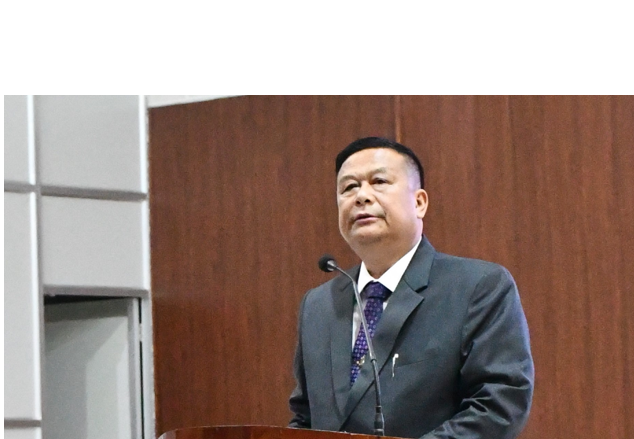At the culmination program of the Vigilance Awareness Week held on 1st November 2024, at I. Ihoshe Kinimi Hall, Lumami, Nagaland University, Chief Information Commissioner, Nagaland, I. Meyionen Jamir emphasised the shift in Naga society from its traditional values of simplicity, hospitality, and honesty to a troubling acceptance of corruption as a norm, informed Peter Ki, PRO Nagaland University.
Jamir underscored the urgent need for a collective effort to combat this issue, starting with transforming the mindset of the populace. This transformation hinges on educating individuals about the detrimental effects of corruption on society. He stressed that public awareness of their rights is crucial to prevent the misappropriation of welfare schemes meant for the masses.
As the Chief Guest, Jamir articulated the significance of the theme “Culture of Integrity for Nation’s Prosperity.” The Commissioner asserted that integrity, defined as adherence to moral and ethical principles, serves not only as a personal virtue but as the foundation of successful societies. In our national context, integrity cultivates trust among citizens, fosters cooperation, and enhances transparency in governance and business practices.
Download Nagaland Tribune app on Google Play

Jamir noted that educational institutions, such as colleges and universities, play a pivotal role in shaping future citizens. By embedding a culture of integrity within these environments, we can empower students to appreciate the importance of honesty, accountability, and respect for others—qualities essential for personal growth and vital for national advancement. A culture of integrity not only enriches individual character but also strengthens the social fabric, promoting responsibility and trust, which are invaluable in any society.
He urged the inclusion of ethical discussions in academic curricula, advocating for open dialogues about moral dilemmas and modelling integrity through actions. This approach nurtures critical thinkers who are aware of the implications of their choices on their communities and the nation. Moreover, educating children and youth about public integrity equips them with the knowledge, skills, and motivation to actively prevent, condemn, and combat corruption.
Highlighting the significance of integrity as a guiding principle in life and education, Jamir expressed optimism that together we can create an environment where honesty and accountability thrive, leading to a more prosperous future for generations to come.
The Commissioner made a distinction between punitive and preventive vigilance. Punitive vigilance involves timely action against officials who exhibit irregularities, while preventive vigilance seeks to minimise opportunities for malpractice through established protocols that ensure transparency and accountability. Despite numerous anti-corruption laws and enforcement agencies, Jamir lamented the pervasive nature of corruption across various sectors, arguing that continuous public sensitisation is essential. Preventive vigilance fosters an organisational culture where ethical practices are prioritised, leading to greater efficiency and effectiveness.
Citing exemplary figures like Mahatma Gandhi, Lal Bahadur Shastri, and Nelson Mandela—leaders known for their integrity and moral fortitude—Jamir reinforced that such qualities bolster organisations and nations alike. Integrity, morality, and ethics are interwoven, forming the backbone of society. He quoted Dr. A.P.J. Abdul Kalam, who stated, “I work with integrity and succeed with integrity,” emphasising that these principles are foundational to a healthy society and are crucial for a prosperous nation.
In a brief address, Prof. J.K. Patnaik, Vice Chancellor of Nagaland University, highlighted the necessity of individual freedom for sustaining democracy, which can only be upheld through the rule of law, transparency, and accountability. He noted that integrity is vital for citizens, both in adhering to laws and in exercising their rights within the state’s delivery systems.
The welcome address was delivered by Prof. Dipak Sinha, Chief Vigilance Officer of Nagaland University, who outlined the various activities conducted during Vigilance Awareness Week 2024. The program, chaired by Dr. Pitheli K. Jimo from the Department of Sociology, concluded with a vote of thanks by NU PRO Peter Ki, and was attended by deans, heads of departments, faculty, administrative staff, and students.

